June 14, 2025 | 19:01 GMT +7
June 14, 2025 | 19:01 GMT +7
Hotline: 0913.378.918
June 14, 2025 | 19:01 GMT +7
Hotline: 0913.378.918
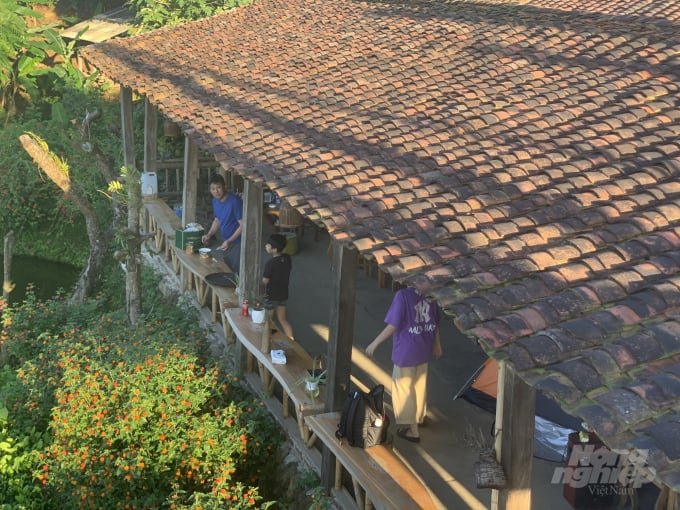
The yin-yang tiled roof houses of the Dao Tien people (one of the branches of the Dao ethnicity) in Hong Thai. Photo: Dao Thanh.
The village land with large terraced fields of the Dao people in Hong Thai today originally belongs to the Tay people. More than 200 years ago, due to greed, this Tay village tried to rob opium and gold coins from merchants passing through the land.
Opium resin made strong men who can cut down hsienmus and ironwoods in the forest as limp as a noodle, with faces as green as leaves. The incessant craving for opium plus the fear of being retaliated by merchants led them to sell their fields and then the whole village to the Dao people in exchange for 12 bags of cotton. After that, they left the village in a hurry at night.
Succeeded in attaining the village of the Tay people, the Dao Tien people started clearing the land to make more terraced fields up to 80 hectares and gathering a lot of water from the top of the mountain to fill those fields. Shaping the fields to have them carried the presence of mountains and rivers, gently weaving around the village, giving life to the Dao people. Since then, the Dao people have become the true master of Kia Tang mountains and forests.
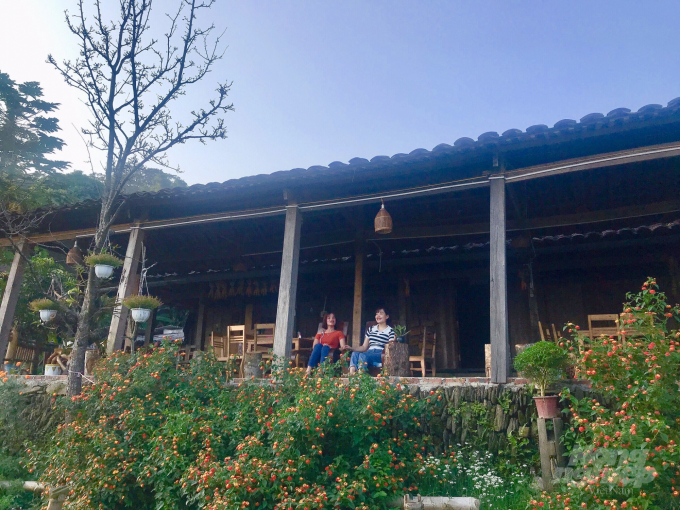
The thriving homestay service helps people in Hong Thai greatly increase their income. Photo: Dao Thanh.
Mr. Ban Quy Tinh's house in Khau Trang village, Hong Thai commune, Na Hang district (Tuyen Quang) is packed with people that day, all surrounding the flickering fire. The rumbling sound of footsteps and chatters stopped when Mr. Tinh started telling the story of this Dao village.
The Dao people in Hong Thai in the past did not know how to develop tourism. Mr. Tinh, who was a commune official, was sent to the Dao village in Ha Giang to learn the way.
Returning after the trip, he started encouraging his relatives to make a large stone gate to the village. The stone fence walls were neatly rearranged. The ancient yin-yang tiled roofs were retained, the installment for iron and steel roofs was limited. Heeding his words, people in the village embarked on the journey to building a full-fledged homestay village.
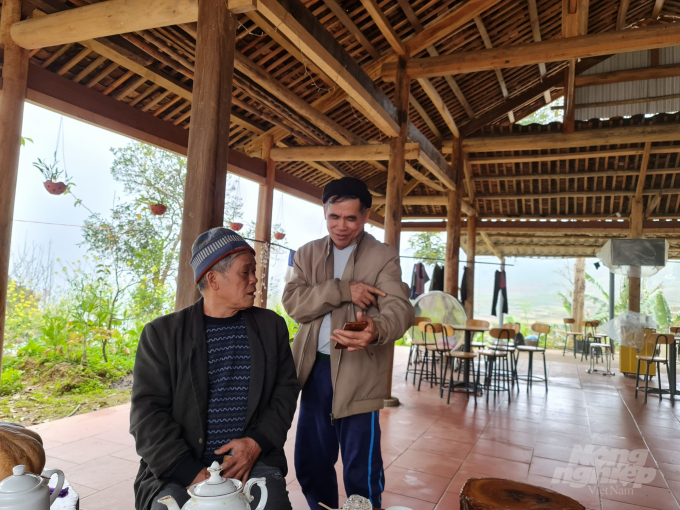
Mr. Ban Quy Tinh (standing) sharing stories about the culture of the Dao people in his hometown. Photo: Dao Thanh.
Groups and groups of lowland guests then started visiting Hong Thai to witness the more misty mountain peaks and terraced fields. Especially when the rice terraces are brimmed with ripening golden color, or when the pear flowers and the yellow canola flowers graciously bloom, all the Dao people have to do is to stand at the village gate to welcome guests, guide them down the beautiful roads and tell them the uniqueness of this village and its people.
"From a rural village, now it becomes a familiar homeland for generations of Dao children who have traveled far away to find their way back. Not only are the villagers looking to return but many tourists have also paid their visit to this land and decided to stay with the Dao for a while, together raising a glass of old corn wine mingled with the pleasing perfumed yeast and leaves.”
The Dao village in Hong Thai is home to three big families: Ban, Dang, and Dang. Among those three families, the example of one who achieves literacy to transform the village, Mr. Dang Duc Toan, former Secretary of Hong Thai Party Committee, is always the talk of the village.
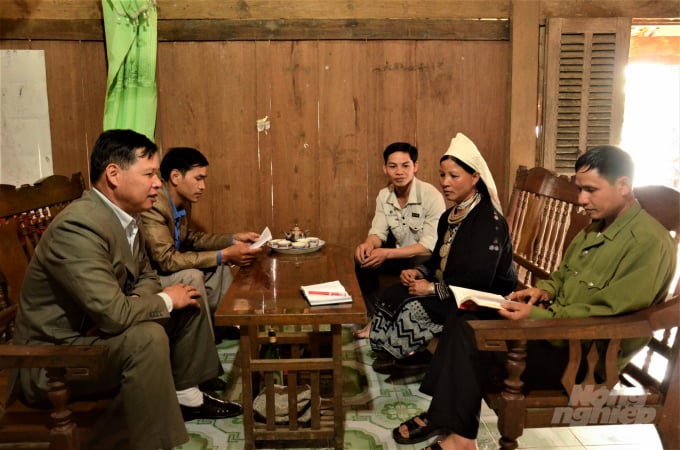
Mr. Toan (leftmost) discussing how to execute homestay tourism with the people of Hong Thai. Photo: Dao Thanh.
In 1983, after finishing high school, Toan returned to the commune to work and was assigned as a union official in the agriculture extension office. His superiors tasked him with changing the economic mindset of the people in his hometown.
From the day he received the assignment, he barely ate or slept. The potential to be considered incompetent by his superiors is one thing, but what worried him most was the fear of people having no faith in a brighter future. He went from house to house, even making campaigns so that people may understand the importance of changing the crop and livestock developing structure, increasing agroproduction activities as well as replacing new high-yield and high-quality rice and maize varieties.
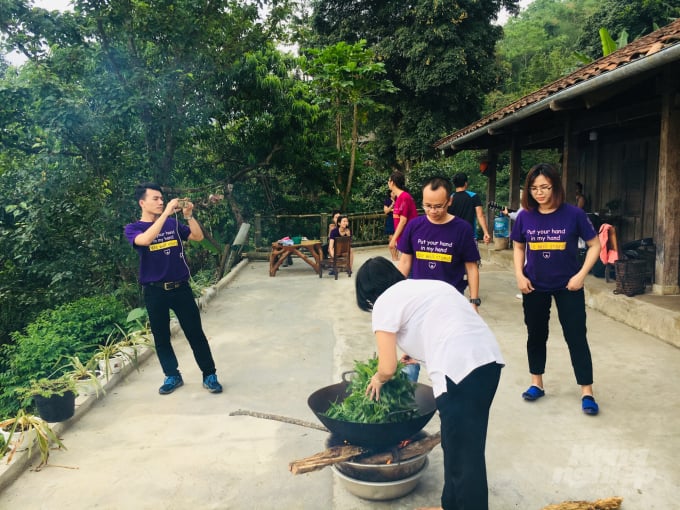
Tourists experiencing the act of stirring Snow Shan tea. Photo: Dao Thanh.
The pear trees growing around his homeland gave Mr. Toan an idea. He then invited staff from the Department of Science and Technology of Tuyen Quang province to research and develop pear trees as economic development subject in his hometown.
His idea was not well-received by the locals at first because “even planting rice and corn is not enough to put food on the table sometimes, we don’t know how growing pears will be better”. But a few years after, when the pear trees were harvested, the money from pear sales could fill the rice bag in the kitchen corner of every house. The villagers were then certain to put their trust in him and his head. Because of that event, later when he came up with the idea of expanding the area of Snow Shan tea and planting more specialty tea varieties such as Ngoc Thuy and Phuc Van Tien, people unanimously responded.
Now the pear tree area in Hong Thai has expanded to 50 hectares with some families earning hundreds of millions of Vietnamese dong from growing pears. The tea tree area is also increased up to hundreds of hectares. Some specialty dried bud tea products have a price of VND 500,000 - 1,000,000/kg.
Translated by Samuel Pham

(VAN) The working delegation from the Ministry of Agriculture and Environment conducted an important trip to the Netherlands to strengthen strategic partnerships and sustainable development in the agricultural sector.

(VAN) The letter ‘A Plea from the Ocean’ not only evokes emotion but also awakens the human conscience to the responsibility of protecting life on Earth.

(VAN) The Department of Agriculture in South Africa has announced the country’s first mass vaccination of poultry to prevent local birds from contracting avian influenza.

(VAN) Establishment of the Mekong Delta Regional Agricultural Linkage Center, aiming for a closed value chain, deep processing, trading platforms, and international market connectivity.

(VAN) Gia Lai province has recently recorded 460 rare species of animals and plants, contributing to forest conservation and biodiversity planning in the region.

(VAN) Ms. Caroline Beresford, New Zealand Ambassador to Vietnam, expressed confidence that agricultural cooperation between Vietnam and New Zealand will develop sustainably, be climate-resilient, and promote gender equality.

(VAN) Vietnam reaffirms its commitment to international cooperation in fostering sustainable and responsible fisheries while ensuring resilient livelihoods for small-scale fishing communities.